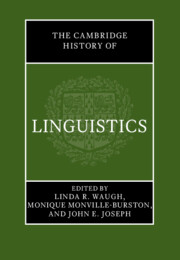Book contents
- The Cambridge History of Linguistics
- The Cambridge History of Linguistics
- Copyright page
- Dedication
- Contents
- Figures
- Tables
- Contributors
- Preface
- Acknowledgments
- Abbreviations, Acronyms, Special Symbols, and Other Conventions
- Introduction
- Part I Ancient, Classical, and Medieval Periods
- Part II Renaissance to Late Nineteenth Century
- Part III Late Nineteenth-through Twentieth-Century Linguistics
- Part IIIA Late Nineteenth Century through the 1950s: Synchrony, Autonomy, and Structuralism
- Part IIIB 1960–2000: Formalism, Cognitivism, Language Use and Function, Interdisciplinarity
- 17 Chomsky and the Turn to Syntax, Including Alternative Approaches to Syntax
- 18 Functionalist Dimensions of Grammatical and Discourse Analysis
- 19 Semantics and Pragmatics
- 20 Language and Philosophy, from Frege to the Present
- 21 Lexicology and Lexicography
- 22 Generative Phonology: its Origins, its Principles, and its Successors
- 23 Phonetics and Experimental Phonology, c. 1950–2000
- 24 Historical and Universal-Typological Linguistics
- 25 Language and Society
- 26 Language and Anthropology
- 27 Language and Psychology, 1950–Present: A Brief Overview
- 28 Semiotics
- 29 Applied Linguistics
- References
- Index
19 - Semantics and Pragmatics
from Part IIIB - 1960–2000: Formalism, Cognitivism, Language Use and Function, Interdisciplinarity
Published online by Cambridge University Press: 20 July 2023
- The Cambridge History of Linguistics
- The Cambridge History of Linguistics
- Copyright page
- Dedication
- Contents
- Figures
- Tables
- Contributors
- Preface
- Acknowledgments
- Abbreviations, Acronyms, Special Symbols, and Other Conventions
- Introduction
- Part I Ancient, Classical, and Medieval Periods
- Part II Renaissance to Late Nineteenth Century
- Part III Late Nineteenth-through Twentieth-Century Linguistics
- Part IIIA Late Nineteenth Century through the 1950s: Synchrony, Autonomy, and Structuralism
- Part IIIB 1960–2000: Formalism, Cognitivism, Language Use and Function, Interdisciplinarity
- 17 Chomsky and the Turn to Syntax, Including Alternative Approaches to Syntax
- 18 Functionalist Dimensions of Grammatical and Discourse Analysis
- 19 Semantics and Pragmatics
- 20 Language and Philosophy, from Frege to the Present
- 21 Lexicology and Lexicography
- 22 Generative Phonology: its Origins, its Principles, and its Successors
- 23 Phonetics and Experimental Phonology, c. 1950–2000
- 24 Historical and Universal-Typological Linguistics
- 25 Language and Society
- 26 Language and Anthropology
- 27 Language and Psychology, 1950–Present: A Brief Overview
- 28 Semiotics
- 29 Applied Linguistics
- References
- Index
Summary
The author identifies semantics as the representation of meaning and pragmatics as the context dependent assignment of meaning, and discusses the issue of the scope of semantics and the difference between dictionary (decontextualized meaning) and encyclopedia (information about branches of knowledge).
He then divides this chapter into four sections. The first one is concerned with lexical semantics, in particular, componential analysis of lexemes and their semantic relations, semantic fields, semantic primes, and prototype (and stereotype) semantics. The next section discusses the semantics-(generative) syntax interface by Katz, and alternatives such as generative semantics, conceptual semantics, case/thematic roles, semantics and pragmatics in (functionalist) Role and Reference Grammar, and semantic frames and meaning in Construction Grammar.
The third section describes predicate (and propositional) logic and linguistic meaning, based on truth conditions and semantic components, as well as extensions and intensions, and includes semantic and pragmatic constraints on anaphora (as in Discourse Representation Theory). The last section deals with aspects of pragmatics, especially the role of context (including the context of use).
The chapter concludes with the importance of scripts (predictable personae and sequence of events) and conversational implicatures (inferences that arise from conventional expectations, allowing for understandable underspecification of meaning).
Keywords
- Type
- Chapter
- Information
- The Cambridge History of Linguistics , pp. 618 - 655Publisher: Cambridge University PressPrint publication year: 2023

